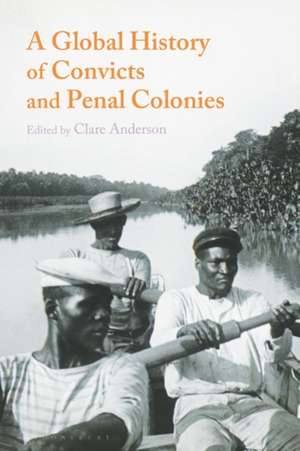A Global History of Convicts and Penal Colonies
Editat de Clare Andersonen Limba Engleză Hardback – 16 mai 2018
| Toate formatele și edițiile | Preț | Express |
|---|---|---|
| Paperback (1) | 228.62 lei 6-8 săpt. | |
| Bloomsbury Publishing – 19 feb 2020 | 228.62 lei 6-8 săpt. | |
| Hardback (1) | 632.44 lei 6-8 săpt. | |
| Bloomsbury Publishing – 16 mai 2018 | 632.44 lei 6-8 săpt. |
Preț: 632.44 lei
Preț vechi: 1115.22 lei
-43% Nou
Puncte Express: 949
Preț estimativ în valută:
121.01€ • 126.36$ • 99.93£
121.01€ • 126.36$ • 99.93£
Carte tipărită la comandă
Livrare economică 15-29 aprilie
Preluare comenzi: 021 569.72.76
Specificații
ISBN-13: 9781350000674
ISBN-10: 1350000671
Pagini: 408
Ilustrații: 30 bw illus
Dimensiuni: 156 x 234 mm
Greutate: 0.74 kg
Editura: Bloomsbury Publishing
Colecția Bloomsbury Academic
Locul publicării:London, United Kingdom
ISBN-10: 1350000671
Pagini: 408
Ilustrații: 30 bw illus
Dimensiuni: 156 x 234 mm
Greutate: 0.74 kg
Editura: Bloomsbury Publishing
Colecția Bloomsbury Academic
Locul publicării:London, United Kingdom
Caracteristici
Uses a connected history approach to link various contexts and periods and reveal the significance and global reach of penal colonies
Notă biografică
Clare Anderson is Professor of History at the University of Leicester, UK. She is a member of the British Academy Area Panel for South Asia and on the Advisory Council of the Institute for Historical Research and is currently editor of the Journal of Colonialism and Colonial History. Her recent publications include Subaltern Lives: Biographies of Colonialism in the Indian Ocean World, 1790-1920 (2012) and Mutiny and Maritime Radicalism in the Age of Revolution: A Global Survey (2013).
Cuprins
1. Introduction: A Global History of Convicts and Penal Colonies (Clare Anderson, University of Leicester, UK)2. The Portuguese Empire, 1100-1932 (Tim Coates, College of Charleston, South Carolina, USA)3. The Spanish Empire, 1500 to 1898 (Christian G. De Vito, University of Leicester, UK)4. The Scandinavian Empires in the Seventeenth and Eighteenth Centuries (Johan Heinsen, Aalborg University, Denmark)5. The French Empire, 1542-1976 (Jean-Lucien Sanchez, Centre for Sociological Research on Law and Penal Institutions, CESDIP, France)6. The Dutch East India Company in Asia, 1595-1811 (Matthias van Rossum, International Institute of Social History, the Netherlands) 7. Transportation from Britain and Ireland, 1615-1875 (Hamish Maxwell-Stewart, University of Tasmania, Australia)8. British India, 1789-1939 (Clare Anderson, University of Leicester, UK)9. Post-colonial Latin America since 1800 (Ryan C. Edwards, University of Tennessee at Chattanooga)10. Russia and the Soviet Union from the 19th to the 21st Century (Sarah Badcock, University of Nottingham, UK and Judith Pallot, Christ Church, University of Oxford, UK)11. Japan in the 18th and 19th Centuries (Minako Sakata, Tomakomai Komazawa University, Japan)12. Modern Europe, 1750-1950 (Mary Gibson, CUNY, USA and Ilaria Poerio, University of Reading, UK)Epilogue: In Carceral Motion: Disposals of Life and Labour (Ann Laura Stoler, New School for Social Research, New York, USA)BibliographyIndex
Recenzii
Anderson's work is a welcome addition to a field which merits more investment . [It] introduces contemporary theoretical concerns, as well as the concerns of contemporary activists to historical topics.
In documenting the magnitude, diversity and near-ubiquity of convict transportation and penal colonies across five centuries, Anderson and her collaborators transform the marginalised and fragmented history of the global convict into a story central to European expansion, labour control and enduring empire. Drawing on a wealth of archival material and an exceptional range of national and imperial perspectives, this is an outstanding contribution to the critical literature on carceral geographies and prison histories. It is also global history at its most innovative, insightful and combative.
In this stunning account of convict circuitry across the globe, Clare Anderson and contributors prove without a shadow of a doubt that convicts made the modern world. Tracking their movements and their carceral traces across nations, empires and many dispersed spaces in between, the authors map a remarkable range of social, economic, cultural, labor, gendered and racial histories. In the process, they model a transnational method that follows the archive while recognizing how distorted it is by the way that penal regimes worked. Students of global history will turn to this book as an example of world history from below for many years to come.
There is much in this volume to savour. It represents a significant addition to a growing corpus of work.on the importance of convict labour in the histories of both punishment and unfree labour. And these volumes demonstrate admirably the importance of taking a global and transnational approach to these questions.
In documenting the magnitude, diversity and near-ubiquity of convict transportation and penal colonies across five centuries, Anderson and her collaborators transform the marginalised and fragmented history of the global convict into a story central to European expansion, labour control and enduring empire. Drawing on a wealth of archival material and an exceptional range of national and imperial perspectives, this is an outstanding contribution to the critical literature on carceral geographies and prison histories. It is also global history at its most innovative, insightful and combative.
In this stunning account of convict circuitry across the globe, Clare Anderson and contributors prove without a shadow of a doubt that convicts made the modern world. Tracking their movements and their carceral traces across nations, empires and many dispersed spaces in between, the authors map a remarkable range of social, economic, cultural, labor, gendered and racial histories. In the process, they model a transnational method that follows the archive while recognizing how distorted it is by the way that penal regimes worked. Students of global history will turn to this book as an example of world history from below for many years to come.
There is much in this volume to savour. It represents a significant addition to a growing corpus of work.on the importance of convict labour in the histories of both punishment and unfree labour. And these volumes demonstrate admirably the importance of taking a global and transnational approach to these questions.
